|
Bargain
Hunt?
It’s amazing what you
find offered on eBay, including signed copies of one’s own books. Now there’s
nothing startling about that, but there was a time when, having been asked to personalise
a signed copy to an old chum, I added the dedication To Alex, and only Alex, so he can’t give it to anyone else for
Christmas, the mean bastard, only to find it on eBay some years later
advertised as having “a unique author inscription” whereupon it sold for £47.
Happy now, Alex?
This month I have found
a first edition of my debut novel Just Another Angel on offer. This
one is not signed – and therefore should be incredibly valuable, being so rare.
(You were thinking that, weren’t you?)
The asking price is indeed high – £75 – but not because I did not sign
it, but because it was a review copy once in the possession of Alan Hunter
(1922-2005).

The book is offered
along with an invitation to the official launch, held at Hatchards bookshop in
Colchester, and sent to Alan in his capacity as the chairman of the East
Anglian branch of the Crime Writers’ Association at the time. It may still
exist – well, East Anglia does.
Alan Hunter was the
author of more than 40 crime novels, most of them (all of them?) featuring
Inspector George Gently, and I got to know him at the convivial meetings he
chaired in a variety of his favourite pubs in Norfolk.
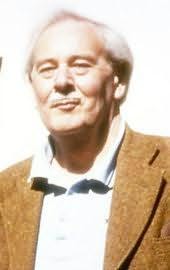
He was always polite
and generous with his advice and so grateful when I reviewed one of his Gently
novels for the Telegraph that he
almost bought me a drink. The television series of George Gently brought him posthumous fame and new publishing deals
for his backlist, but I cannot think he would have been pleased with the small
screen adaptations of his work.
Getting to know Alan
came only after that first book of mine was published and I had been
inaugurated, kicking and screaming, into the Crime Writers Association, which
of course only happened after that first book launch in Colchester over thirty
years ago on the 16th August 1988.
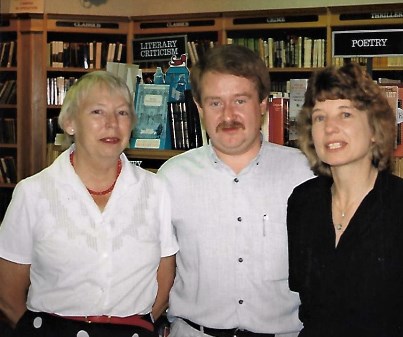
Naturally, I was there;
seen here flanked by bookshop manager Penny Bell (who remains a friend and
neighbour) and the legendary Elizabeth Walter, the editor of the famous Collins
Crime Club.
We had a splendid time
and the more eagle-eyed reader will spot the word “Beverages” on the invitation
card Alan Hunter used as a bookmark. The beverages in question were supplied by
the Adnams brewery of Southwold. No further explanation is required, except to
say that Alan Hunter never turned up, although later he did tell me he had
read, and enjoyed, the book.
Brian
Garfield
The year 2018 had a
nasty sting in its tail: the news that American thriller writer Brian Garfield had
died on 29th December, aged 79.
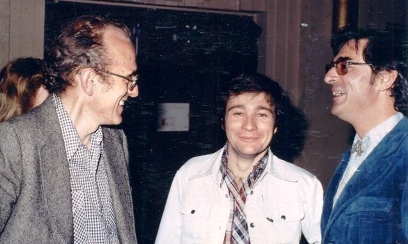
Seen here (far right)
in the 1970s in New York with fellow thriller writers Donald Westlake and
Justin Scott, Garfield made his name with his vigilante thriller Death
Wish which was filmed by Michael Winner and starred Charles Bronson. So
notorious was the film that Garfield later wrote a follow up novel ‘as a
penance’, but long before that he was an established author of westerns and was
to become a successful writer of crime and thriller fiction, including highly
regarded spy stories Hopscotch (1975) and Checkpoint
Charlie (1981?), a book I have heard much about though never seen as I
do not think it was ever published in the UK.
I discovered Brian
Garfield when I realised, with a gasp of admiration, that Americans could also
write excellent historical thrillers (it was the era of The Eagle Has Landed) and
I thoroughly enjoyed Kolchak’s Gold (1973) and The
Paladin (1980), which was, unsurprisingly, a huge bestseller in the UK
as it concerned a personal and very special secret agent employed by Winston
Churchill during WWII.
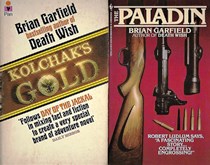
His novels may have
fallen from memory in this country, which is sad, because I place him among
that coterie of Americans, including Robert Ludlum, Justin Scott, Noel Behn and
Clive Cussler, who broke the British monopoly on bestselling thrillers in the
1970s.
If only there was an
award-winning ‘reader’s history’ of that exciting period of thriller-writing; I
would certainly recommend it.
Tartan
Seriously Noir
Anyone who was
fortunate enough to enjoy Douglas Lindsay’s mellifluous and heart-felt rant
about publishing and publishers at last year’s CrimeFest in Bristol, will be overjoyed though unsurprised that he
has a new publisher for his latest novel featuring a new policeman hero.

Song of the Dead
from Mullholland is the first in a series (Book 2 is scheduled for May and Book
3 is already written) to feature Scottish police detective – and ex-MI6 agent –
Ben Westphall.
All fictional
detectives are supposed to have quirks, but unlike most Scottish fictional
detectives, Westphall doesn’t go into pubs or listen to a particular kind of
music. His quirk is a total aversion to flying (for a very good reason as it
turns out) even though this makes life difficult for him when investigating a
crime which involves travelling not only all over Scotland, but to London and,
crucially, to Estonia where a man pronounced dead twelve years before turns
up alive with a very bizarre story to tell, and although it is not dwelt on,
the details of his missing years are particularly gruesome.
Consequently, Westphall
spends an awful lot of time in cars and on trains and ferries, whilst known
associates in Scotland of the “dead” man who wasn’t murdered in Estonia twelve
years before, start being murdered for real. One of his long car journeys, from
Tallinn to Scotland via the Channel Tunnel, (spoiler alert) has a particular impact
on Westphall as well as possibly being of historical value once Brexit makes
such free movement improbable.
As a hero, Westphall
has a lot to offer and Song of the Dead is a sufficiently
complex and gripping introductory case, once disbelief is suspended that a
working police detective could be away from his desk unaccompanied and
‘travelling’ for large chunks of his working week, that all the indications are
for a bright fictional future.
I
Spy
I was in the process of
proclaiming that I had already discovered the spy story of the year when I
discovered that Safe Houses by Dan Fesperman was actually published in December
2018 by House of Zeus and I had been slow to get around to it.
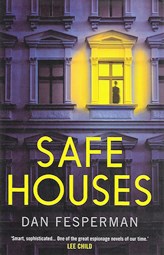
Whatever, this is a
cracking piece of spy fiction – only to be expected from one of the best
American exponents of the genre as his 2012 novel The Double Game was
actually a homage to spy fiction and an absolutely must-read book for any fan
of spy-fi.
From his award-winning
debut Lie in the Dark in 1999, Fesperman has consistently produced interesting,
often provocative, thrillers and proved that just when you think the story is
moving along logically and predictably, he can deliver a gut-wrenching twist
which rocks the reader. In Safe Houses, the first sucker-punch
comes as early as Chapter 4 but if I told you any more, I would most likely
have to be killed.
With a narrative split
between Berlin and Paris in 1979 and a small town in Maryland in 2014, the
novel proves that for a spy, there is no such thing as a really safe ‘Safe House’.
(Inside) Cover Girl
Authors occasionally, though not always, get to see their own smiling faces staring out from the back dust jacket flap of their hardbacks. Rarely, though, do authors’ mugshots appear on their paperback editions. If they do, it is a sure sign that the author has made it into the big time and is worthy of such an honour.
I have never seen a full colour portrait of an author grace the inside cover of a paperback before until now, when a splendidly regal photograph (credit: Louise Bowles) appears in Death of an Honest Man, the 34th adventure for top Scots cop Hamish Macbeth from Constable.
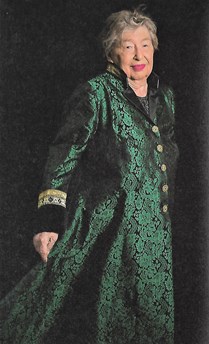 
As the author in question is M.C. Beaton, the author of (by my count) over 130 novels under various pen-names, one cannot begrudge Marion this honour, for surely she has ‘made it’ if anyone has.
|
|
Books of the Month
It’s a bumper crop this month and I cannot pretend to have done them justice in this brief summary, but – hey – so many books, such a short month and so many parties to go to.
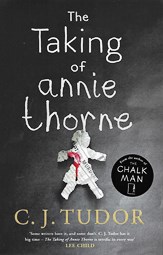
The Taking of Annie Thorne by C.J. Tudor from Penguin/Michael Joseph, comes recommended by Lee Child (as does Dan Fesperman’s Safe Houses), calling it ‘terrific in every way’ and claiming that ‘Some writers have it, and some don’t. C.J. Tudor has it big time.’ As I always do, I will follow Lee’s recommendation and, if it is anything like her bestselling The Chalk Man, I expect to have to keep the lights on at night and my blood pressure monitor handy.

Australian Jane Harper also has a follow-up to a bestseller out this month. In fact her third novel, The Lost Man (Little, Brown), is the follow-up to two bestsellers, The Dry and last year’s Force of Nature, which I really liked. Once again, the Australian outback is a central character in Harper’s fiction, the Queensland setting being laid out in an endpaper map with the useful orientation points that Brisbane is 1500 kilometres one way and Adelaide a mere 1200 kilometres another. There’s no denying that when Jane Harper picks up her criminal paint brushes, which she does with great skill, she likes a large canvas.
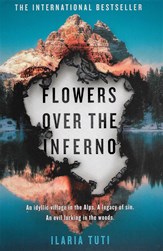
And whilst we are still in the European Union and have freedom of movement, I will happily annoy Brexiteers by highlighting two foreign writers who are coming over here and taking our readers. The first is Italian Ilaria Tuti with her debut Flowers Over The Inferno published by Weidenfeld & Nicolson, which is set in a quiet village in the Italian Alps and introduces Superintendent Teresa Battaglia, who has, I believe, become something of a feminist icon when the novel was published in Italy. Teresa is, in the words of her creator, ‘slightly surprising as thriller characters go, mostly because she is pretty ordinary, in her sixties, a bit overweight, fairly plain, living with a serious condition – diabetes – and with a notorious temper’.
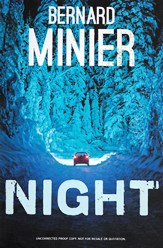
A French author whose latest thriller involves a French detective, a murder in Norway and a chase leading to Austria, shows just how these European types get everywhere. Bernard Minier’s fourth novel Night, published by Mullholland Books, sounds to be just as spooky as his earlier The Frozen Dead which won the Prix Polar at the Cognac Crime Festival (surely a worthy rival to the infamous Chianti Crime Festival). The translation, by Alison Anderson, for the Mulholland edition is clearly aimed at the UK market rather than the American one for at one point the hero Servaz ‘held the flame from his lighter up to his fag’.
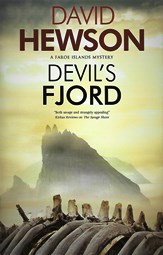
A British author making the most of his freedom of movement whilst he can is veteran thriller writer David Hewson, whose new novel Devil’s Fjord from Crème de la Crime, is set in the Faroe Islands which would be in the EU if anyone had remembered them. Wherever they are, whale-hunting seems to be an important part of the economy, almost as valuable, I believe, as knitting jumpers for Danish television detectives. The disappearance of two young brothers from the remote fishing/whaling village of Djevulsfjord leads to some gruesome home truths not to mention some gruesome scenes of cetacean slaughter. A past master at conjuring up intriguing foreign settings, David Hewson has placed intriguing thrillers in Rome, Florence, southern Italy, Denmark and Holland before now, but never, I think I’m right in saying, in his native town of Bridlington, where over 60% of voters opted for Brexit. Just saying.
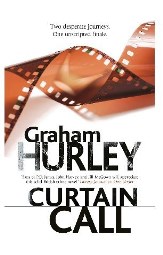
Curtain Call by Graham Hurley, from Severn House, is a new departure for an author who has admitted to a long-standing love affair with France and the French, which is not surprising as his highly-regarded Faraday and Winter crime series have been successfully adapted for French TV despite being set originally in Portsmouth. In Curtain Call Hurley introduces a new character (and narrator), a middle-aged actress recently diagnosed with a brain tumour who gets involved in a journalist’s quest to prove political malpractice during the Brexit vote. Actually, this is not entirely new territory for the talented Hurley, as he has successfully employed female protagonists before now and although a follow-up is in the pipeline, fans of his ‘other strand’, the excellent historical thrillers in his Wars Within series, need not despair as a new one of those, Raid 42, will be published in June.
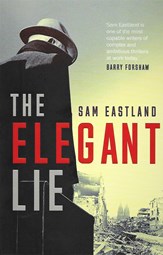
For reasons which escape me, but I must have offended someone, I never saw the last two ‘Inspector Pekkala’ thrillers by Sam Eastland. I certainly cannot think how I might have offended Sam Eastland, for I was a great fan of those books from the start as well as the impressive and imaginative novels published under his real name, Paul Watkins. However, I am looking forward to his latest venture, The Elegant Lie, published by Faber, another historical thriller but this time set in 1949 as the temperature in the Cold Ware starts to drop. The location is, interestingly, the bomb-ruined city of Cologne rather than the usual suspect, Berlin.
Next Big Thing?
The next big thing in the crowded world of ‘psychological’ thrillers, if advance sales to foreign territories and supportive blurbs from celebrity figures are anything to go by, is debut novel The Silent Patient by Alex Michaelides, from Orion who are certainly hoping it can emulate the sales figures of a Gone Girl or a Before I Go To Sleep, which it probably will.

The patient in question is Alicia, an artist with considerable psychological baggage, who seems deeply in love with her fashion photographer husband right up to the point where she shoots him five times in the head. And no, this is not the most badly-organised game of Russian roulette ever; she clearly did it but won’t say why. In fact, she won’t say anything; not a word, and maintains her unresponsive silence for more than six years until a forensic psychotherapist called Theo joins the staff of the secure unit where she is being held and seems set on helping her back to normality. Meanwhile, Alicia is keeping a secret diary, but not giving much away except, perhaps, confirming her own paranoia, though as Theo begins to investigate her past, one begins to wonder just how reliable a narrator he is. Spoiler alert: not very, though the entire book is populated by unsympathetic, untrustworthy characters acting suspiciously.
I was rather surprised to read the recommendation from National Treasure Stephen Fry, who claims he ‘never saw the ending coming’ as I naturally assumed Stephen was just the sort of chap who had seen Kind Hearts and Coronets.
Helen MacInnes
Although I have appeared on several, I am still not too sure what a ‘podcast’ is. I was, however, persuaded to ‘tune in’ (if that’s the right terminology) to the latest podcast on the Spybrary network – and I say ‘network’ in the sense of a dedicated and highly efficient, if not secret, ring of fans of spy fiction.
I was particularly interested in the latest broadcast by Spybrary for two reasons; firstly because the subject was Helen MacInnes, and secondly because I had been asked to contribute a few words on the author once described as the Queen of spy writers. {Not having the required technological expertise to participate live, I sent my contribution by carrier pigeon and, of course, in code.}
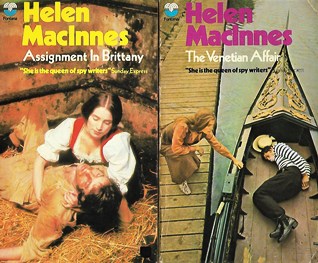
The result can be heard at www.spybrary.com/66 and it will hopefully provoke younger readers into trying the works of an author seriously in danger of being forgotten but who, in her day, was compared to Eric Ambler and Graham Greene.
Geography Lesson
After my visit to Sicily on ‘family business’ in the Autumn, I did some retrospective geography revision over Christmas by re-reading The Palermo Ambush, one of Colin Forbes’ early thrillers, first published in 1972.

The pen-name of Raymond Sawkins (1923-2006), Forbes began his thriller writing career, as did so many others with military experience back then, with adventures set during WWII. I had forgotten how fast the action moved in The Palermo Ambush which is basically a breathless race by a small British commando unit (aided by the Mafia) across hostile territory from Palermo to Messina to destroy a vital German troop transport.
It is very much in the mould of Alistair MacLean’s Guns of Navarone and just as exciting. Having visited much of the dangerous terrain of northern Sicily featured in the book, I am rather glad I didn’t re-read it before I went.
Pip! Pip!
The Ripster
|